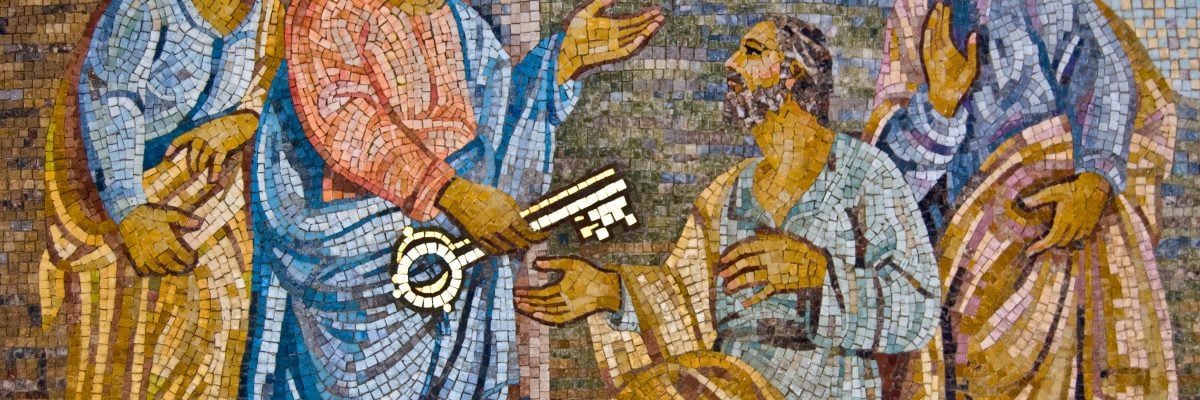
Having celebrated the Solemnity of Pentecost, the descent of the Holy Spirit to empower Jesus’ apostles to fulfill their divine mandate, we should continue rejoicing, because God makes biblically clear on this feast that he established the Church to restore his kingdom as a “catholic” or “universal,” worldwide blessing—not simply one confined to the nation of Israel.
During the Last Supper, Jesus prays that his disciples will be one as he and his heavenly Father are one. In addition, we know that God’s word—Jesus’ prayer, in this case—will not return void. It will be fulfilled (Isa. 55:10-11). Since Jesus has ascended into heaven, what means does he provide for his followers to achieve the unity for which he prayed, for future generations of his disciples to discern who is legitimately leading God’s people? Jesus assures his disciples that he will be with us to the end of time, but how is Christ to guide us when we can’t see or hear him anymore?
Jesus reveals his solution at the Last Supper, indicating that he is establishing his apostles—and presumably their successors—as his divinely ordained leaders to maintain and foster the unity we are called to have in him and his Father. As Old Covenant Israel had twelve tribes in leading God’s people, so New Covenant Israel, the Church, would have the leadership of the twelve apostles. The power of reconciliation that Jesus gives them flows from the more fundamental power to teach and govern God’s people in general: “As the Father has sent me,” Jesus tells them, “even so I send you” (John 20:21).
How did the Father send Jesus? Our Lord makes this abundantly clear before his ascension:
Now the eleven disciples went to Galilee, to the mountain to which Jesus had directed them. And when they saw him they worshiped him; but some doubted. And Jesus came and said to them, “All authority in heaven and on earth has been given to me.Go therefore and make disciples of all nations, baptizing them in the name of the Father and of the Son and of the Holy Spirit, teaching them to observe all that I have commanded you; and lo, I am with you always, to the close of the age” (Matt. 28:16-20, emphasis added).
The Father sent Jesus with full authority on heaven and earth to redeem the world (see John 3:16-17), and so Jesus commissions his apostles to do the same in his name and power, promising that he will remain with and sustain them until he returns again to judge the living and the dead.
What will this worldwide/catholic missionary project look like? We know from the three covenants God made in Genesis that Abraham’s descendants will first be a great nation (12:1-3, ch. 15), then an even greater kingdom (ch. 17), and finally a worldwide blessing (ch. 22).
We know that this kingdom will be centered in the person and throne of David and his successors, one of whom would rule God’s people forever, as David learned from a prophecy God gave through his friend Nathan:
When your days are fulfilled and you lie down with your fathers, I will raise up your offspring after you, who shall come forth from your body, and I will establish his kingdom. He shall build a house for my name, and I will establish the throne of his kingdom for ever (2 Sam. 7:12-13).
We know that the Davidic kingdom fell in 586 B.C., and yet more than one prophet proclaimed that it would one day be restored, consistent with God’s promise to David (see, e.g., Isa. 11:1-10; Amos 9:11-12).
On that first Pentecost Sunday, as recorded in Acts 2, Peter reminds the people of Israel that God swore a covenant oath to David that he would place one of his descendants on his throne (v. 30), a descendant who, unlike David, who died and whose tomb was in their midst in Jerusalem to that very day, would not suffer bodily corruption (vv. 25-29).
The only descendant of David who claims to be a king, and who also rose from the dead, is Jesus Christ—so Peter testifies to his Israelite brethren (Acts 2:30-36; see also Matt. 16:18-19; Luke 1:32-33). And at the subsequent council of Jerusalem, James reaffirms that Jesus has restored the kingdom of David in establishing his Church, whose mission is the evangelization of the whole world (Acts 15:13-18).
In establishing his kingdom, what does Jesus say he will do? He says he will establish it on the apostle Peter, who alone will have “the keys of the kingdom of heaven” in leading Christ’s Church (Matt. 16:18-19). To confirm this, he gives Peter a new name, which appears as Cephas several times in the New Testament, (e.g., John. 1:42). This is the Grecized form of the Aramaic word kepha, which undoubtedly means “large rock.”
Jesus’ anointing of Peter in the New Covenant Israel parallels the structure of the Old Covenant Davidic kingdom, which had both a succession of kings and stewards or prime ministers who governed the king’s house in the king’s name (Isa. 22:15-25). We learn from the prophet Isaiah that this latter position was one of succession, as the righteous Eliakim replaces the corrupt Shebna, signaling that the restored house of David would have a similar office of succession with primacy of authority under the leadership of the king.
And so if Judas had an apostolic successor (Acts 1:12-20), how much more important was it that Peter, the leader of the apostles, have one?
In addition, whereas the Old Covenant Davidic stewards had the key of the house of David (Isa. 22:22), Peter and his successors have the keys of the kingdom of heaven (Matt. 16:19), so that they could fulfill Jesus’ Great Commission to make disciples of all nations, and not simply the ethnic descendants of Abraham, Isaac, and Jacob and those who have otherwise joined their Old Covenant religion. And whereas the Old Covenant Davidic steward had the power to bind and loose (open and shut) within the house of David, whatever Peter and his successors bind and loose across the earth will be bound and loosed in heaven itself!
The Old Covenant prime ministers were “fathers to the inhabitants of Jerusalem and to the house of Judah” (Isa. 22:21), and Peter and his successors would be father or “popes” to the inhabitants of the New Jerusalem—i.e., the New Covenant Israel/Church (see Gal. 6:14-16).
To fulfill the Great Commission that Jesus mandates, an invisible and ambiguously led people of God will not suffice. The countless denominations that have resulted in the 500 years since the Protestant Reformation testify to that event’s divisive fruits, antithetical to Jesus’ passionate prayer for unity during the Last Supper (John 17:20-23).
This prayer for unity does not guarantee that the Church and popes who safeguard it will be impeccable—without sin. There is, sadly, plenty of evidence over twenty centuries to illustrate the human failings of the Church.
But we are and remain united in the Catholic, universal faith because of what Jesus did 2,000 years ago, has continued to do to the present time, and will continue to do until his Second Coming.
We are and remain Catholic because the Church is a divinely established and divinely sustained salvific project. And so we can confidently echo the words to Jesus that our first pope spoke 2,000 years ago after Christ’s preaching on the Eucharist that proved too hard for many of disciples to endure:
Lord, to whom shall we go? You have the words of eternal life; and we have believed, and have come to know, that you are the Holy One of God (John 6:68-69).



